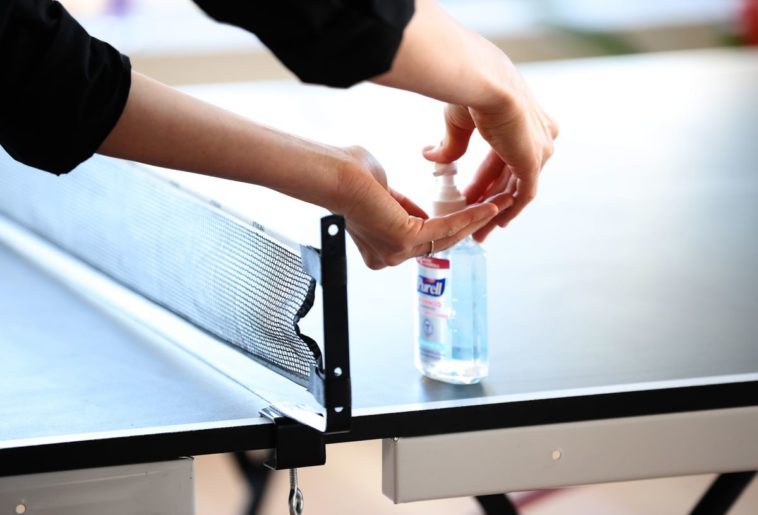Why frequent use of hand sanitizer could make us sick down the road – The Globe and Mail
/cloudfront-us-east-1.images.arcpublishing.com/tgam/RE7GMYKOSBKOFCLIQG676HVC3A.jpg)
An employee with tech startup company Fast uses hand sanitizer after playing a game of ping pong in the office in San Francisco, California, on March 24, 2021.
Justin Sullivan/Getty Images
For years, Brett Finlay has been encouraging people to get comfortable being surrounded by germs.
Dr. Finlay, a microbiologist at the University of British Columbia, has led studies and written papers and books about the importance of the human microbiome – the universe of microbes that live in and among us – and the need to expose ourselves to a diversity of microorganisms to keep us healthy.
But just as people began embracing probiotics and fermented foods, discarding antibacterial soaps and getting over our collective fear of germs, along came the COVID-19 pandemic. Almost overnight, hand sanitizer, disinfectants and stay-at-home rules have become the order of the day.
While such measures are critical in the fight against COVID-19, Dr. Finlay and other experts worry they could have a harmful effect on our microbiomes, with lasting consequences for our health.
“Suddenly, hand sanitizer goes through the roof, we all wear masks and we don’t touch anyone or anything. And from what we know is that generally, that’s probably not good from just an ordinary microbial exposure point of view,” he said, saying that measures such as getting outside and eating a healthy diet can help counteract this.
Tracking Canada’s COVID-19 vaccine rollout plans: A continuing guide
Coronavirus tracker: How many COVID-19 cases are there in Canada and worldwide? The latest maps and charts
Over the past decade, researchers including Dr. Finlay have found dysbiosis, or an imbalance of the composition of microbes in the body, is associated with an array of chronic conditions and diseases, including obesity, diabetes, asthma and various auto-immune diseases.
And so while emphasizing that pandemic control measures are necessary in the near term, Dr. Finlay and his colleagues anticipate they’re also preventing people from acquiring a diversity of microbes, and accelerating the loss of microbes, potentially contributing to higher rates of these health issues in the long term. In response, they recommend spending time outdoors to increase one’s exposure to microbes, and eating balanced, high-fibre diets instead of highly processed foods.
Dr. Finlay and a team of scientists with the Humans and the Microbiome program at CIFAR, a Canadian-based global research organization, wrote a recent paper, published in the Proceedings of the National Academy of Sciences, to draw attention to this issue. They noted societal changes over the past century, such as urbanization, hygiene practices and increased consumption of processed foods, have led to a loss of microbial diversity. Moreover, when microbial species with which humans have evolved are wiped out, the loss may be permanent.
It’s yet unknown what the cost of the pandemic will be to the human microbiome, they said. However, they suggested sweeping changes over the past year likely contribute to microbial loss. These changes include intensive disinfection, physical inactivity and consumption of highly processed foods during lockdowns, a decline in social interaction and mobility and the use of antimicrobial treatments because of misdiagnosis or to treat secondary infections from COVID-19.
The consequences are also expected to be “very uneven,” as efforts to control transmission of the coronavirus and access to treatments differ, depending on where people live, their income levels and the size of their households, said co-author Tamara Giles-Vernick, a director of research at the Institut Pasteur in Paris.
Faced with pandemic-related economic hardship and in some parts of the world, food shortages, for example, people now relying on food-assistance programs are experiencing changes to their diet, she said. This, at least in the short term, is expected to cause shifts in their microbiome, explained Dr. Giles-Vernick, head of the non-profit foundation’s anthropology and ecology of disease emergence unit.
Dr. Finlay said he expected any changes to the microbiome would have the most profound effects at “the bookends of life” – that is, among young children and older adults.
“We know that for a child to develop normally, you need microbial exposure,” he said, saying there’s a concern “kids just are not getting the normal microbes that they would have gotten pre-COVID.”
Microbes also influence healthy aging, he explained. After around the age of 65, one’s microbes become more inflammatory, while the gut becomes more permeable, and gut microbes can seep into the body, he said. This causes inflammation associated with tissue damage and aging.
This effect can be intensified when people are not exposed to normal microbes, he said.
Separately, at the University of California, San Diego, professor and infectious disease epidemiologist Steffanie Strathdee pointed to another potential unintended consequence of the pandemic: a worsening crisis of superbugs, or drug-resistant microbial pathogens.
This is, in part, because the pandemic has shifted resources away from fighting superbugs, she said. For instance, many hospital antibiotic stewards, usually infectious disease pharmacists who advise doctors how to use certain antibiotics, have now been diverted to deal with COVID-19, she said.
Moreover, doctors around the world have been overprescribing antibiotics as a way to thwart secondary bacterial infections among COVID-19 patients, added Dr. Strathdee, co-author of The Perfect Predator, a book about her own husband’s near-fatal infection with a superbug.
To control superbugs, which by some estimates will cause 10 million deaths globally a year by 2050, Dr. Strathdee said there is a need to adopt a “one health” conceptual model to achieve health for people, animals and the environment.
“It isn’t enough to just tell doctors, ‘Limit your prescribing of antibiotics,’ ” she said. Rather, the fight against superbugs also requires limiting the use of antibiotics in farming and managing effluent from antibiotic manufacturing plants. It also requires international and multisectoral collaboration, she said.
When it comes to mitigating the effects of the pandemic on the human microbiome, Jason Tetro, author of The Germ Code and The Germ Files, advised getting into nature, eating fresh fruits and vegetables and fermented foods, opening windows and practising “targeted hygiene” instead of indiscriminately disinfecting everything.
With COVID-19, “we have been shocked by a microbe,” he said, but it’s important to remember the vast majority of microbes out there “are harmless to us and many of them can actually provide us with benefits for our health.”
Sign up for the Coronavirus Update newsletter to read the day’s essential coronavirus news, features and explainers written by Globe reporters and editors.
Published at Thu, 01 Apr 2021 12:00:00 +0000





Comments
Loading…